
The sizzle of a juicy steak and the smoky aroma of grilled veggies—there’s nothing like a backyard cookout. But a greasy, crusty build-up on your grill grates can ruin both flavor and food safety. That’s why knowing how to clean gas grill grates properly is essential for every home griller. Let’s explore some simple grill maintenance tips and barbecue cleaning methods to help keep your gear in top shape—and make your next cookout a total success.
Cleaning your gas grill grates may seem like a chore, but it’s essential for cooking delicious food and extending the life of your grill. If you grill frequently, aim for a deep clean every 4–6 months. If you use your grill less often, a deep cleaning once a year may be enough. Still, regular maintenance after each use—like brushing the grates and emptying the drip tray—is crucial for a well-maintained and safe-to-use grill.
Grill grates come in a variety of materials, including cast iron, porcelain-coated, and stainless steel—each with its own care needs. Porcelain grates require gentle, non-abrasive cleaners to avoid damaging the coating, while stainless steel grates can handle a firmer scrub with a wire brush or grill scraper. No matter the type, neglecting your grill grates can lead to rust, food sticking, and a noticeable drop in flavor and cooking performance.
Key Takeaways
- Regular cleaning prevents rust and maintains food quality
- Deep clean frequency depends on grill usage
- Different grate materials require specific cleaning methods
- Avoid wire brushes for safety reasons
- Never put grill grates in the dishwasher
- Use gentle cleaners for porcelain-coated grates
- Soaking grates can help loosen stubborn residue
The Importance of Clean Grill Grates
Clean grill grates are essential for keeping your grill in peak condition and ensuring that grilling stays safe, flavorful, and enjoyable. Regular cleaning not only enhances the taste of your food by preventing old grease and residue from sticking, but also extends the life of your grill by reducing rust and wear. Consistent grate maintenance makes every cookout smoother, tastier, and more satisfying.
Health and Safety Benefits
Clean grill grates are essential for keeping your grill in peak condition and ensuring that grilling stays safe, flavorful, and enjoyable. Regular cleaning not only enhances the taste of your food by preventing old grease and residue from sticking, but also extends the life of your grill by reducing rust and wear. Consistent grate maintenance makes every cookout smoother, tastier, and more satisfying.
Improved Taste and Cooking Performance
Clean grates make your grilled food taste better. They stop old flavors from getting on your food and help heat spread evenly. A grill grate cleaner after each use removes food bits that can change the taste. For tough stains, a baking soda paste can clean them off without harsh chemicals.
Extended Grill Lifespan
Regular cleaning prevents your grill from rusting and corroding, helping it last for many seasons. Use the right brush for your grill grates: a wire brush works best for stainless steel grates, while nylon bristle brushes are safest for porcelain or ceramic-coated grates. For cast iron grates, a Palmyra bristle brush is gentle yet effective. If you grill often, deep clean your grates every 4–6 months. For occasional grillers, a once-a-year deep clean is usually enough. Keeping up with this routine ensures your grill stays in top condition and your food always tastes great.
“A clean grill is a happy grill. Regular maintenance not only improves your food’s taste but also prolongs your grill’s life.”
| Grate Material | Recommended Cleaning Method | Cleaning Frequency |
|---|---|---|
| Stainless Steel | Wire brush, grill cleaner | After each use |
| Cast Iron | Palmyra brush, season after cleaning | After each use |
| Porcelain-Coated | Nylon bristles, gentle cleaners | After each use |
Understanding Different Grill Grate Materials
Grill grates come in various materials, each with unique properties affecting cleaning and maintenance. The three most common types are stainless steel grill grates, cast iron grill grates, and porcelain grill grates. Let’s explore their characteristics to help you choose the best option for your grilling needs.
Stainless steel grill grates are a favorite among backyard grillers thanks to their durability, quick heat-up time, and rust resistance. They’re especially easy to clean, making them a low-maintenance option for casual and frequent grillers alike. If you’re looking for a grate that offers long-lasting performance with minimal upkeep, stainless steel is an excellent choice. It’s ideal for anyone who wants to grill with ease and consistency.
Cast iron grill grates are prized for their exceptional heat retention, making them perfect for creating those bold, restaurant-style sear marks on steaks and other meats. When properly seasoned, cast iron develops a natural non-stick surface that enhances both flavor and cooking performance. While they require a bit more maintenance—including regular oiling to prevent rust—cast iron grates can last a lifetime and consistently deliver superior grilling results for serious barbecue lovers.
Porcelain grill grates strike a great balance between the benefits of stainless steel and cast iron. They offer solid heat retention, making them effective for searing and even cooking, while still being relatively easy to clean. Porcelain-coated grates are typically made from either steel or cast iron, with the porcelain layer providing added protection against rust, corrosion, and food sticking. This makes them a versatile and user-friendly choice for many home grillers—just be careful not to use metal brushes, as they can chip the coating.
| Grate Material | Heat Retention | Maintenance | Durability | Cleaning Ease |
|---|---|---|---|---|
| Stainless Steel | Good | Low | High | Easy |
| Cast Iron | Excellent | High | Very High | Moderate |
| Porcelain | Very Good | Moderate | Moderate | Easy |
When cleaning your grill grates, consider their material. Stainless steel can handle vigorous cleaning, while porcelain-coated grates require gentler treatment to avoid chipping. Cast iron grates need regular seasoning to maintain their non-stick properties and prevent rust.
Essential Tools for Cleaning Gas Grill Grates
Keeping your grill grates clean is essential not only for delicious-tasting food but also for maintaining a long-lasting, high-performing grill. Whether you’re a weekend warrior or a serious griller, having the right cleaning tools makes the job quicker, safer, and more effective. Let’s explore the top tools every grill owner should have for keeping their grates in tip-top shape.
Brushes and Scrapers
A wire brush is one of the most effective tools for removing tough, baked-on grime from grill grates. For fast and efficient cleaning, the Weber 12″ Three-Sided Grill Brush is a great choice—it can clean your grates in as little as 2 minutes and 30 seconds. If you’re looking for a bristle-free, safer alternative, the Kona Safe/Clean Grill Brush is highly recommended, though it takes a bit longer—around 3 minutes and 40 seconds—to get the job done. Both brushes are excellent options for keeping your grill grates clean and cooking-ready.
Cleaning Solutions
A dedicated grill grate cleaner is essential for deep cleaning and maintaining top performance. One of the best natural solutions is a homemade mix of 2 cups of vinegar and 1 cup of baking soda. This powerful combo works wonders on stubborn grease and carbon build-up, making your grates look like new. For porcelain-coated grates, which are more delicate, use a gentler solution of baking soda, mild dish soap, and warm water to clean without scratching or damaging the coating.
Protective Gear
Remember to protect yourself while cleaning. Always wear gloves when dealing with cleaning solutions or hot grates. Safety glasses can also protect your eyes from flying debris. With the right tools and safety gear, cleaning your grill grates will be easy and safe.
| Cleaning Method | Average Time | Effectiveness Rating |
|---|---|---|
| Wire Brush | 2-4 minutes | 4/5 |
| Vinegar Solution | 40 minutes | 3/5 |
| Steam Cleaning | 2-3 minutes | 4/5 |
Preparing Your Grill for Cleaning
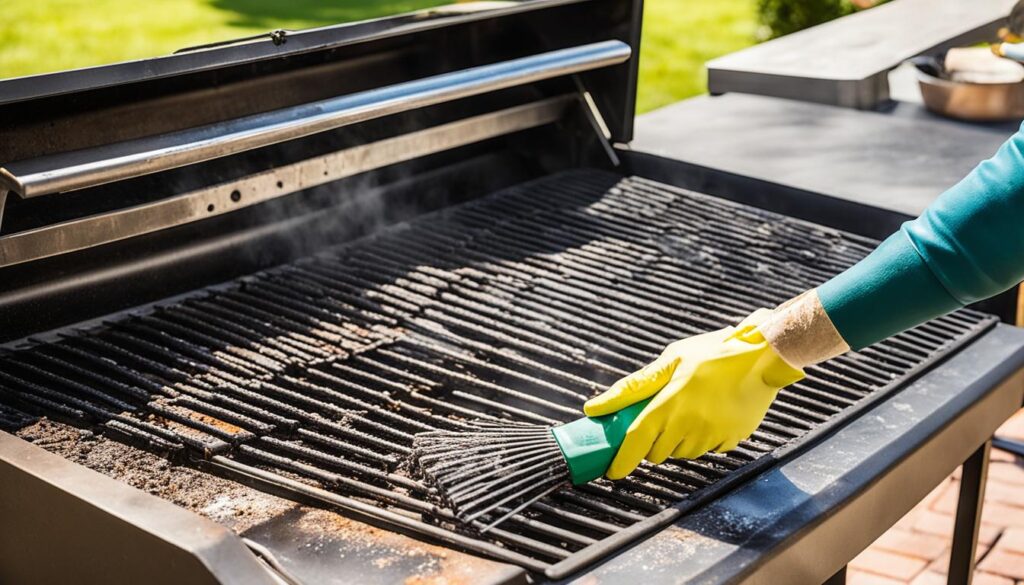
Starting with proper preparation is key to effective grill maintenance. A well-prepared grill makes cleaning easier and more efficient. Begin by turning on your grill to high heat for 15 minutes. This step helps loosen stuck-on food, making it easier to clean.
After performing a burn-off to loosen residue, allow your grill grates to cool slightly—they should be warm to the touch, not hot. At this stage, it’s best to remove the grates if possible to make cleaning more thorough and manageable. Taking them out also gives you the chance to inspect and clean other internal parts, like the heat plates (flame tamers) and burner tubes, which are often overlooked but essential for maintaining even heat distribution and grill performance.
Before you start cleaning, gather all the tools you’ll need. Here’s a list of what you should have:
- Grill brush or scraper
- Cleaning solution (commercial or homemade)
- Protective gloves
- Bucket of warm, soapy water
- Clean cloth or paper towels
Make sure you have good ventilation when using cleaning products. If you’re using strong chemicals, consider wearing a mask. Regular cleaning not only helps your grill cook better but also makes it last longer.
| Cleaning Frequency | Percentage of Grill Owners |
|---|---|
| After every use | 40% |
| Deep clean every 4-6 months | 45% |
| Rarely or never clean | 15% |
How to Clean Gas Grill Grates: Step-by-Step Guide
Keeping your gas grill grates clean is key for great meals and a grill that lasts. Let’s explore effective ways to clean burnt food and keep your grill in top shape.
Burn-Off Method
The burn-off method is one of the easiest and most effective ways to clean gas grill grates. Simply heat your grill on high for 15–20 minutes—this intense heat will carbonize leftover food and grease, turning them into dry, flaky residue. After the grill cools slightly (grates should be warm, not hot), use a wire grill brush to easily scrape off the loosened debris, leaving your grates clean and ready for your next cookout.
Brushing and Scraping
For regular upkeep, brushing and scraping are top choices. Use a wire grill brush or a nylon scouring pad to remove loose particles. For tough spots, try a grill stone or aluminum foil. Clean your grates after each use to stop buildup.
Deep Cleaning Techniques
Deep cleaning your grill grates is essential every 4–6 months if you grill regularly. Start by soaking the grates in hot, soapy water for 15–20 minutes to loosen baked-on grease and stains. For extra-tough grime, use a vinegar and water solution to help break down buildup naturally. To tackle grease splatters on surrounding surfaces, a Mr. Clean Magic Eraser works wonders and is safe on most grill exteriors. Consistent deep cleaning not only improves performance but also extends the life of your grill.
| Cleaning Method | Frequency | Time Required |
|---|---|---|
| Burn-Off | After each use | 15-20 minutes |
| Brushing/Scraping | After each use | 5-10 minutes |
| Deep Cleaning | Every 4-6 months | 40-60 minutes |
Remember, different grate materials need special care. Stainless steel grates work well with a stainless cup attachment tool, while cast iron grates should be seasoned after cleaning. With these tips, you’ll learn how to clean gas grill grates and enjoy tastier food from a well-kept grill.
Natural Cleaning Solutions for Grill Grates
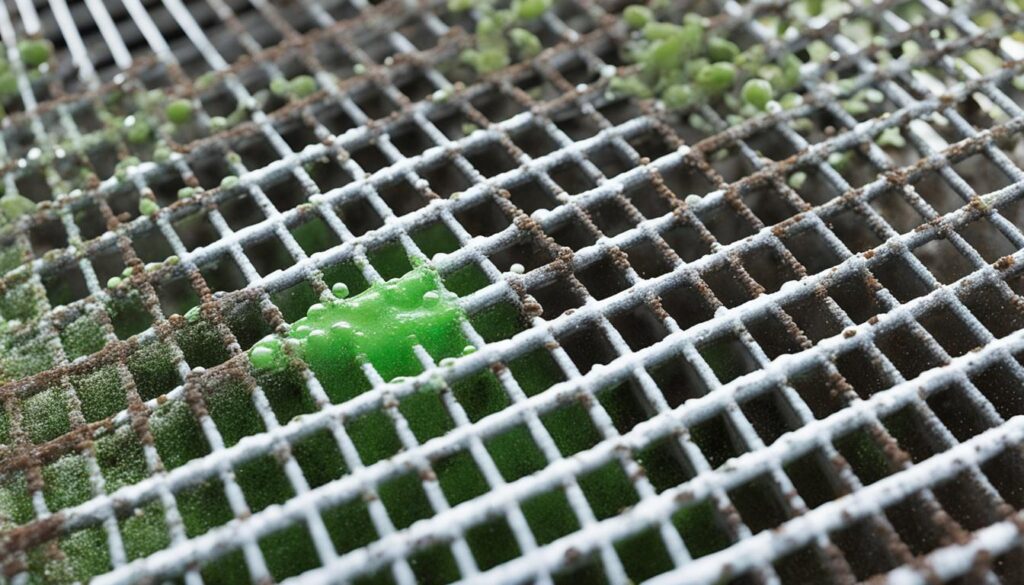
Want to clean your grill grates without using harsh chemicals? Try these natural, non-toxic cleaning solutions that are both safe and effective. A vinegar grill cleaner is a popular go-to—just mix equal parts white vinegar and water in a spray bottle for a powerful natural degreaser. Spray it directly onto warm grates, let it sit for a few minutes, then scrub with a brush. For stubborn, baked-on residue, create a baking soda paste (mix baking soda with a bit of water) and apply it to the grates before scrubbing. These eco-friendly methods leave your grill clean without the chemicals.
Here’s a powerful cleaning method:
- Mix 1 ½ cups baking soda with ½ cup water to form a paste
- Apply the paste to your grates
- Let it sit for 10 minutes
- Scrub with a nylon brush
- Rinse thoroughly
For really tough grime, try this baking soda grill cleaner solution:
- Combine 2 cups white vinegar with 1 cup baking soda
- Soak grates overnight
- Rinse and dry completely
These methods work well for most grate materials and don’t leave harmful residues. Regular cleaning after each use prevents buildup and keeps your grill in top shape. Remember to oil your grates after cleaning to prevent rust and make future cleanings easier.
Dealing with Stubborn Grease and Grime
Dealing with tough grease and grime on your grill grates needs special care. Let’s look at ways to remove these residues and get your grates clean again.
Soaking Methods
Soaking your grates can be a game-changer for hard-to-remove grime. Fill a big container with hot, soapy water and soak the grates for a few hours. This softens the tough residues, making them easy to wipe away. For places like restaurants, soaking grates in a vinegar and baking soda mix overnight works best to clear out debris.
Vinegar and Baking Soda Solution
Make a strong cleaner for your grill by mixing vinegar and baking soda equally. Spread this paste on the grates and wait 30 minutes. The mix’s fizzing action breaks down the grease. Then, scrub with a grill brush or an aluminum foil ball to get rid of the grime.
Commercial Degreasers
Commercial degreasers are a strong choice for cleaning off burnt food and hard grease. Follow the instructions on the bottle, making sure to rinse it off before it dries. For any grime left, use a chainmail scrubber for the best clean.
| Cleaning Method | Best For | Time Required |
|---|---|---|
| Soaking in Soapy Water | Light to Moderate Residue | 2-4 hours |
| Vinegar and Baking Soda | Stubborn Grease | 30 minutes – 8 hours |
| Commercial Degreaser | Heavy Buildup | 15-30 minutes |
Cleaning your grill regularly stops grease and grime from building up. If you grill often, deep clean your grates every 4-6 months. This keeps your grill working well and your food tasting great.
Maintaining Clean Grill Grates Between Uses
Keeping your grill clean is essential for tasty and safe meals. After grilling, brush the grates when they’re still warm. This prevents food from sticking and makes cleaning easier later.
Put a thin layer of cooking oil on the grates to prevent rust and make food slide off easily. For gas grills, heat them up for 15 minutes after cooking to burn off residue. This makes cleaning easier next time.
Clean the heat deflectors every four uses to keep cooking temperatures even. Always cover your grill when not in use to protect it from dust, dirt, and bugs.
Regular cleaning cuts down on deep cleaning and makes your grill last longer. Brush grates after every use and do a deep clean every 4-6 months if you grill often. These steps will keep your grill ready for your next outdoor cooking session.
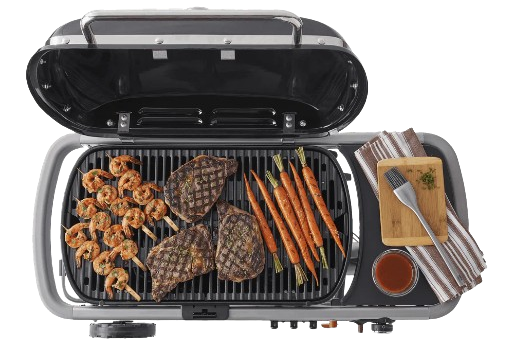
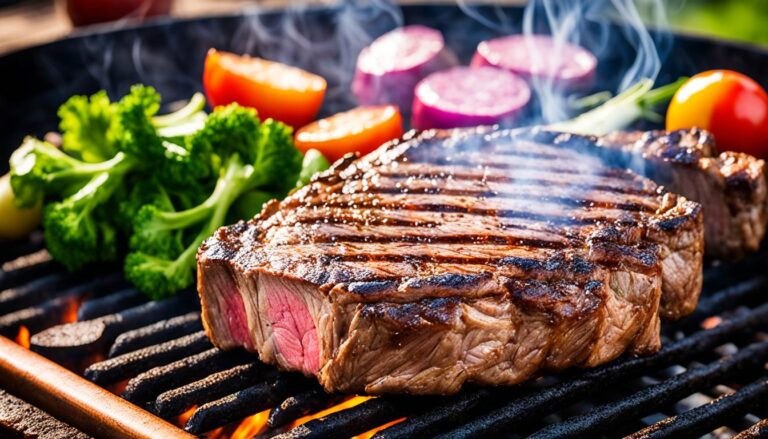
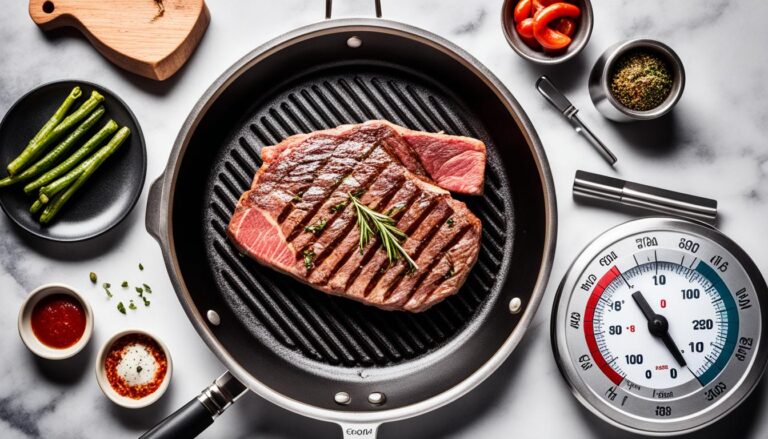
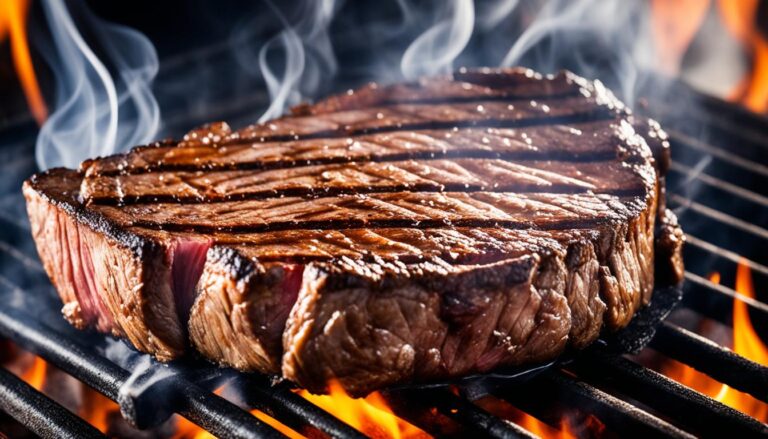
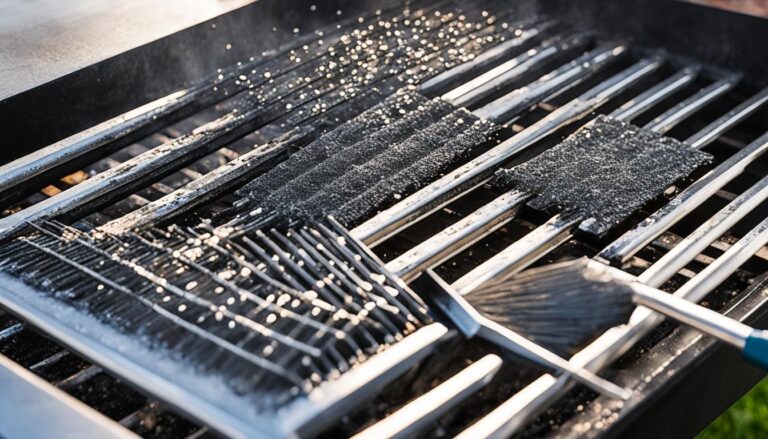
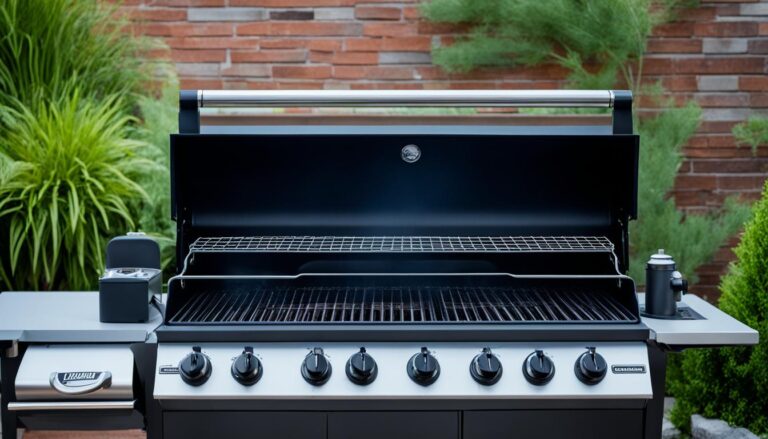
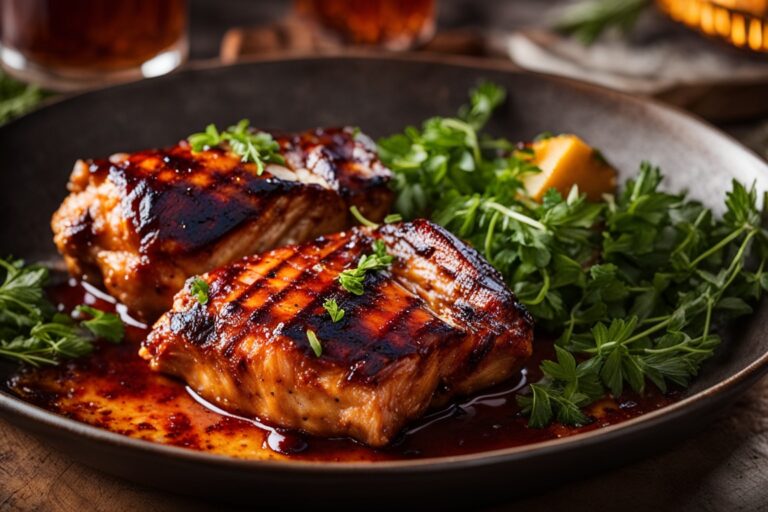
One Comment